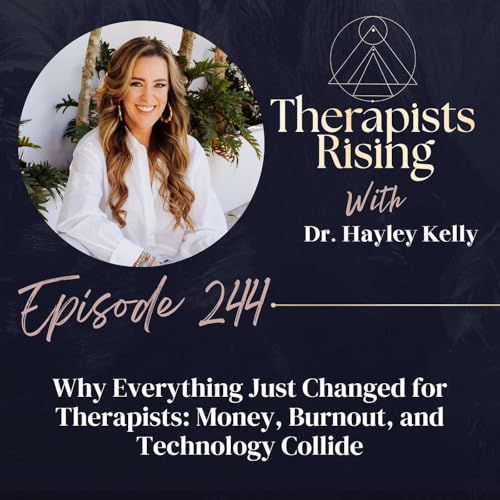Let's talk about passive income, and NO, this isn't another "make money while you sleep" pitch.
This conversation with Kayla Das is the most honest, transparent take on passive income for therapists I've heard in a LONG time. Kayla's a Canadian social worker, business coach, author of The Passive Practice, and someone who's actually DONE this work. She's built multiple passive income streams and she's willing to tell you the TRUTH about what it really takes.
Here it is: passive income isn't passive at the beginning. It's WORK. Consistent, upfront, sometimes-discouraging work. But once it's established? That's when you get your time back. That's when you can help more people without burning out in one-to-one sessions.
If you're tired of trading hours for dollars and wondering if there's another way—this episode is for YOU.
HERE ARE THE 3 KEY TAKEAWAYS FROM THIS EPISODE:
1️⃣ Passive Income Is NOT Passive at the Beginning – This is NOT a get-rich-quick scheme. It's a "slow and steady wins the race" strategy. You'll put in consistent work upfront—sometimes for MONTHS—before you see revenue. Kayla didn't make a dime from her blog for six months. But she kept going. And now? It works on autopilot (mostly). Once it's built, you never start from scratch again.
2️⃣ Earned Income vs. Passive Income Changes Everything – One-to-one therapy = earned income. You work X hours, you make X dollars. There's a ceiling. With passive income, you create something ONCE—a course, blog, digital product, podcast—and it generates revenue over and over. That's what creates time freedom. But you need an audience to share it with (email list, social media, organic traffic).
3️⃣ It's About Pivoting, Not Quitting – Kayla's digital templates made NOTHING the first 30 days. Zero dollars. But she didn't scrap them. She pivoted—changed the marketing images, rewrote descriptions, tested things. Then it worked. The issue isn't usually your product—it's how you're presenting it. Be willing to fail, learn, and adjust.
YOU'LL ALSO HEAR:
- Why most therapists recreate their old employment environment in private practice (and how passive income changes that)
- Seven types of passive income streams for therapists: blogging, podcasting, online courses, hiring therapists, digital products, books, and affiliate marketing
- The three passive income success indicators that help you choose the RIGHT stream for you
- Why Kayla's blog made $0 for six months—and why she kept writing anyway
- The real reason most therapists don't pursue passive income (it's the upfront "no money" period)
- Why you NEED an audience before you launch
- How to know if you're ready to start building a passive income stream
RESOURCES MENTIONED IN THIS EPISODE:
Kayla Das:
- Book: The Passive Practice: The Passive Income Roadmap for Maximizing Schedule Flexibility, Time Freedom, and Private Practice Profitability (available on Amazon)
- Passive Income Personality Quiz: Find out which passive income stream is the best fit for YOUR personality (6-8 quick questions!)
- Website: KaylaDas.com
Therapists Rising:
- The Incubator: therapistsrising.com/incubator
- Instagram: @dr.hayleykelly
SUBSCRIBE & REVIEW:
If this episode gave you a new perspective on passive income—or if you're ready to stop trading hours for dollars and start building something that works for you—please take a moment to subscribe and leave a review on Apple Podcasts!
Your reviews help more therapists find these real, honest conversations about building the businesses they actually want (without the BS or the hype).
Thanks for being here. See you next week.
 55 分
55 分 1 時間 5 分
1 時間 5 分 19 分
19 分 47 分
47 分 2026/01/2245 分
2026/01/2245 分 2026/01/1436 分
2026/01/1436 分 38 分
38 分 35 分
35 分
